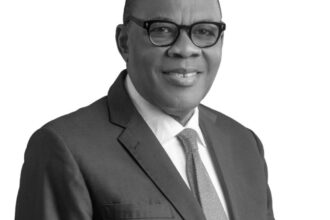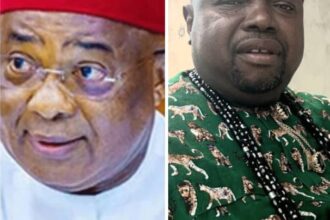
Chioma Ifemeludike Declares Herself ‘Winner’ After Polling 292 Votes in Anambra Governorship Election
The African Action Congress (AAC) candidate in the just-concluded Anambra State governorship election, Ms. Chioma Ifemeludike, has declared herself a winner despite securing a modest total of 292 votes across the state’s 21 local government areas.
The declaration, which has since stirred conversations on social media, came shortly after the Independent National Electoral Commission (INEC) announced the final results of the election, declaring the incumbent Governor, Professor Charles Chukwuma Soludo of the All Progressives Grand Alliance (APGA), as the overall winner.
According to INEC’s Returning Officer, Professor Edoba Omoregie, Governor Soludo secured a total of 422,664 votes to defeat his closest challenger, Nicholas Ukachukwu of the All Progressives Congress (APC), who polled 99,445 votes. Other candidates trailed behind with significantly fewer votes, including Ms. Ifemeludike, who polled 292 votes under the AAC platform.
Despite the outcome, Ifemeludike — an actress, filmmaker, and social commentator — took to her social media platforms to assert that, in her view, victory transcends numbers. She declared herself a winner, emphasizing that her participation was guided by principles of honesty, courage, and integrity rather than political deceit or financial inducement.
In a brief but bold statement, she wrote:
“Integrity stands firm and higher than political deception. I’m a winner.”
The message, though simple, resonated deeply with many of her followers, who lauded her courage to contest in a political landscape often dominated by money, godfatherism, and entrenched party structures.
For Ifemeludike, her self-declaration of victory reflects a symbolic triumph rather than a numerical one. Her candidacy, which drew attention for its uniqueness and courage, represented a quiet but significant rebellion against Nigeria’s traditional political order.
In a pre-election interview, she had described her decision to contest as an act of civic responsibility — one aimed at inspiring young people, especially women, to challenge the culture of political apathy. “We cannot keep complaining about bad governance if we are not willing to participate,” she had said.
Her campaign, though low-budget and largely grassroots-driven, focused on transparency, youth empowerment, gender inclusion, and creative industry development. Even without the massive financial backing or political machinery available to major party candidates, she insisted on running a campaign that reflected her personal values.
Political observers note that Ifemeludike’s participation and her post-election statement highlight a growing movement among Nigerian youth and creatives seeking to disrupt the political status quo — one that prioritizes character, ideas, and ethics over vote-buying and violence.
The governorship election, conducted across Anambra’s 21 local government areas, was largely peaceful, though it recorded pockets of low voter turnout, particularly in some urban centers. INEC officials commended the improved use of the Bimodal Voter Accreditation System (BVAS), which enhanced the transparency of the process despite minor logistical hiccups in a few areas.
Governor Charles Soludo’s victory reaffirmed APGA’s dominance in Anambra politics. Soludo, a former Central Bank Governor and a professor of economics, secured a landslide victory in most local governments, consolidating his position as a key political figure in the South-East.
His closest rival, Nicholas Ukachukwu of the APC, put up a strong showing in parts of Anambra South but was unable to close the wide margin. Candidates of the Peoples Democratic Party (PDP), Labour Party (LP), and other smaller political parties shared the remainder of the votes.
INEC’s Returning Officer, Professor Omoregie, while announcing the results, described the process as credible, transparent, and reflective of the people’s will. He noted that the election outcome demonstrated the deepening of democratic values in Anambra State.
Ifemeludike’s post-election declaration has generated mixed reactions. While many praised her for her boldness and moral conviction, others criticized what they described as a “publicity stunt.”
Supporters argued that her definition of victory represents a moral and ideological statement rather than a rejection of the electoral process. “In a society where corruption and manipulation often determine outcomes, integrity is indeed the real victory,” one supporter wrote on X (formerly Twitter).
However, critics suggested that her statement was self-congratulatory and unnecessary. Some political analysts viewed it as a reflection of the frustration experienced by smaller party candidates who often face structural disadvantages in Nigeria’s heavily monetized electoral system.
Nonetheless, the broader conversation around her candidacy and post-election remarks underscores an emerging narrative in Nigeria’s democracy — one that values participation and principle as much as electoral success.
Before venturing into politics, Chioma Ifemeludike was already a familiar name in Nigeria’s entertainment industry. Known for her outspoken views on social issues, she has been a vocal critic of corruption, moral decay, and hypocrisy in both the entertainment world and governance.
Her transition from the film industry into politics surprised some observers but also attracted a following of young Nigerians who admired her fearlessness and authenticity.
Throughout her campaign, she frequently spoke about bridging the gap between governance and the creative sector, arguing that artists and filmmakers possess the storytelling power to reshape public consciousness and promote national unity.
“If we want a better country, we must start electing people who are ready to serve, not those who see politics as business,” she said during one of her campaign events.
Ifemeludike’s candidacy may not have yielded electoral victory in numerical terms, but her political journey has added a new dimension to Nigeria’s democratic discourse. By standing for election in a highly competitive and often hostile political environment, she has joined a growing list of Nigerian women and youth who are redefining what it means to participate in politics.
Observers believe that voices like hers could gradually shift Nigeria’s political culture toward one that values ideas, inclusivity, and civic integrity.
As one commentator noted, “Every democracy needs people like Chioma Ifemeludike — people who run not because they expect to win, but because they want to prove that conscience still matters.”
While Governor Soludo continues with his second term mandate under the banner of APGA, attention will also remain on emerging politicians like Ifemeludike, who represent the conscience of a restless generation seeking a new direction for the country.
Her declaration — “Integrity stands firm and higher than political deception” — may yet become a rallying cry for those disillusioned by Nigeria’s politics of patronage and power.
In the final analysis, while Soludo may have won the votes, Chioma Ifemeludike’s campaign has arguably won hearts. Her 292 votes, though numerically insignificant, symbolize something profound — the triumph of courage over complacency, and integrity over deception — a reminder that in democracy, every voice, however small, matters.






